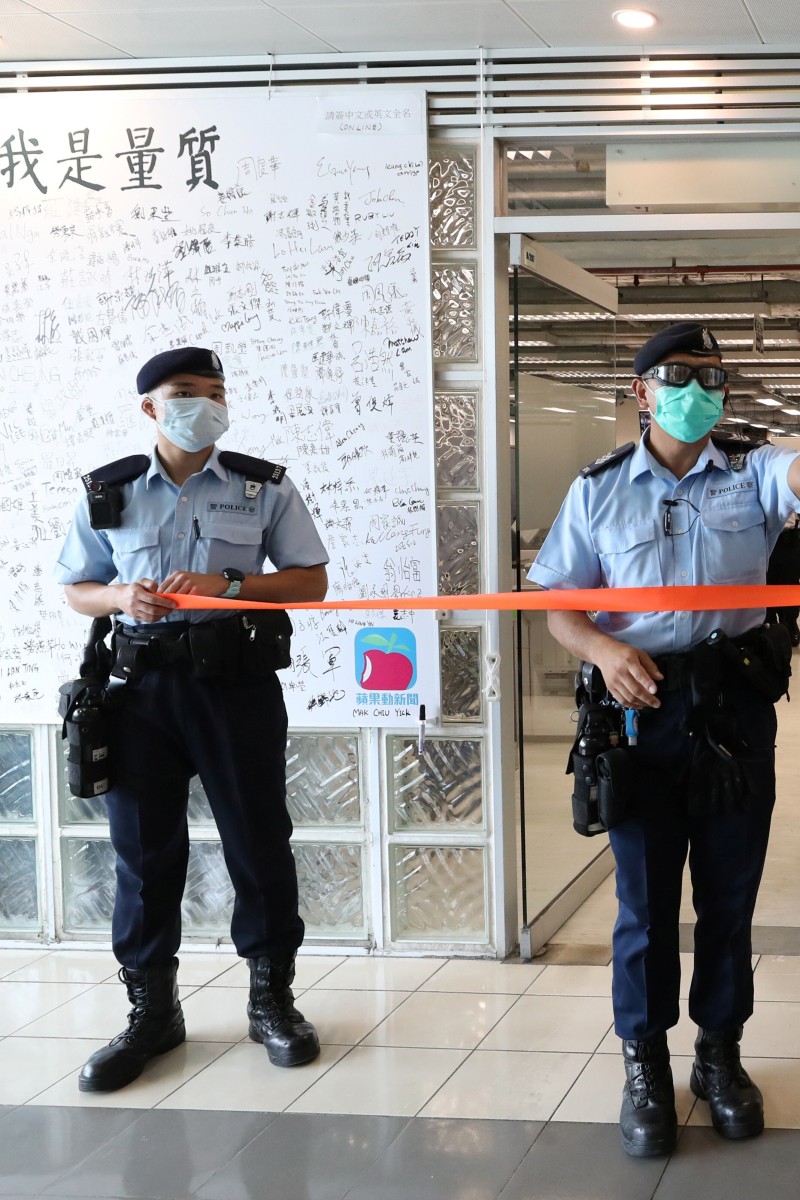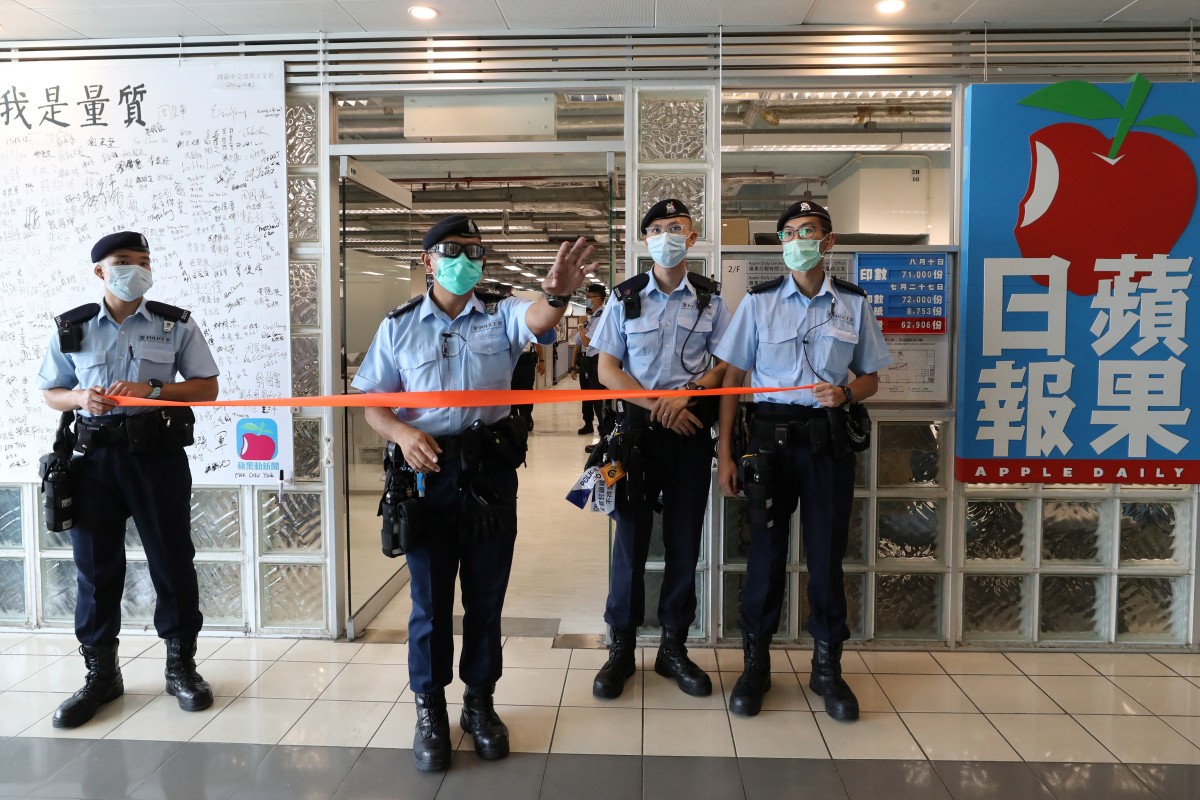
National Security Law: Press freedom under threat in Hong Kong as journalists arrested and face pressure to self-censor
- The offices of Apple Daily were raided and its founder Jimmy Lai was arrested last week
- Cable television provider iCable appointed a new director of news who was seen to be too deferential in an interview with chief of police
 Hong Kong police officers raided the offices of Apple Daily on August 10.
Hong Kong police officers raided the offices of Apple Daily on August 10.Once known for fierce independence and exposing the wrongdoings of the political elite, Hong Kong cable television provider iCable has had the wind taken out of its sails as the central government tightens its grip on the city by arresting journalists and raiding newsrooms.
The broadcaster’s new director of news, Oscar Lee, is best known for being a television anchor and a parenting influencer. He was widely mocked on social media after a recent interview with the police chief, which critics said was overly fawning and deferential.
Hong Kong’s public broadcaster RTHK also cancelled Headliner, a long-running satirical television programme, in May after complaints from the government that it had depicted police officers in a negative manner.
That is China’s intent as investigative journalists are threatened and top news executives shoved aside. Since the arrest last week of media tycoon Jimmy Lai, founder of Apple Daily, reporters and editors have been hiding their notes, protecting contacts on encrypted messaging apps, and contemplating how much prison time they could get for violating Hong Kong’s new national security law.
Jimmy Lai media tycoon and founder of ‘Apple Daily’ was arrested at his home on August 10.
“It would probably be three to five years, but if I plead guilty in court and have good conduct, I will likely get a sentence reduction,” said a reporter at Apple Daily surnamed Chan, who declined to use his full name for fear of retribution.
Such are the calculations in the new era of the National Security Law. The scene of Lai’s arrest, which was livestreamed across the world, showed police rummaging through reporters’ desks and shouting at the paper’s chief editor after he asked to see a search warrant. Outside Apple Daily’s offices, police limited media access to only those that backed the mainland Chinese government.
Who is Jimmy Lai? 10 things to know about the pro-democracy activist and media tycoon
In the stepped-up assault on Hong Kong’s freedoms after a year of pro-democracy protests, the raid on Apple Daily marked a new phase in China’s bid to silence critical reporting in a city with a vibrant history of independent journalism.
Unlike the mainland where media are essentially the propaganda arm of the government, the semi-autonomous Hong Kong has a commercial news industry, which is guaranteed freedom of press under the city’s constitution.
Those rights have been harder to defend. Since Hong Kong was returned to China in 1997 by Britain, the number of outlets willing to report critically on the local and mainland governments has shrunk under political and economic pressure. Newsrooms are often censored by owners who have business interests in China.
Riot police argue with journalists outside a police station where media mogul Jimmy Lai Chee-ying, founder of Apple Daily, was held after he was arrested on August 10. (Photo: Reuters)
What remains of those independent voices is expected to dwindle even further since the introduction of a national security law that criminalises dissenting views of Beijing and calls for greater management and regulation of the news business.
Hong Kong’s sizable foreign press corps also faces an uncertain future. Correspondents’ visa requests have been delayed and expectations are growing that Hong Kong will impose the same strict accreditation process used in the mainland.
“The protest movement in Hong Kong would not have had as much international awareness and attention if Hong Kong wasn’t a free and welcoming place for international journalists,” said Gwyneth Ho, a former local television journalist who was recently disqualified from running for Hong Kong’s legislature for opposing the national security law. “If they’re forced out, then the world will not know what will happen next.”
Who is Agnes Chow? The Hong Kong activist arrested under the national security law
Locally, few outlets have done more to keep the powerful honest than Apple Daily, which was founded in 1995 by Lai after he made a fortune in the clothing business.
An outspoken critic of the Chinese government since the deadly crackdown on pro-democracy demonstrators in Tiananmen Square in 1989, Lai has been labelled by Chinese state media as a “true race traitor” and is accused of colluding with foreign forces by urging the United States to support Hong Kong’s autonomy. He remains free on bail.
“He is a tragedy in which he, as a Chinese, picked the wrong side and walked on the wrong path,” read an editorial in the Global Times after his arrest. The Global Times is a mainland newspaper mostly viewed as a party mouthpiece.
China to ban flying national flag upside down; changes to apply in Hong Kong
Once known for its sensational headlines, Apple Daily has long irritated authorities for its criticism and investigative reporting, exposing abuse of public funds and shoddy work at public construction projects.
Some Hong Kongers have supported embattled media companies. Tens of thousands more copies of Apple Daily than usual were sold last week. Activists briefly pumped up the stock value of the paper’s parent company.
Chan and other journalists at Apple Daily are accustomed to the intensifying battle over telling their stories. He has been pepper-sprayed and struck by tear gas canisters and rubber bullets during street protests.
“In our role, we see a lot of people getting injured and making sacrifices,” he said of the protesters. “They are things they should not have suffered. But at the same time, we have to admit there is nothing we can do to save them and that is where we feel the most powerless.”